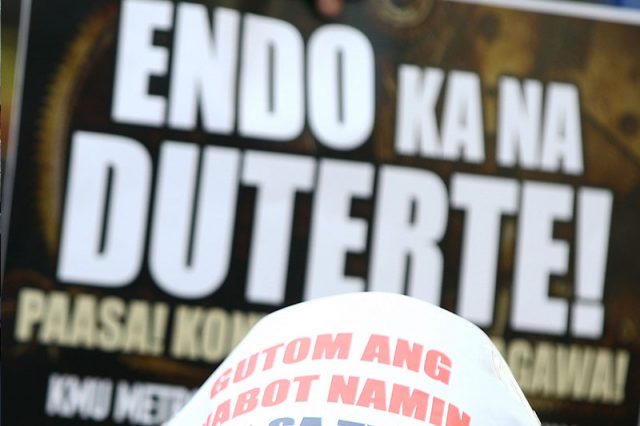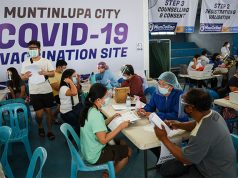
The standoff between picketing workers at food condiment giant NutriAsia and police forces has taken a violent turn. Those who bore witness to the violence have shared stories from the strike that has lasted for almost two weeks.
The clash at NutriAsia shows how even after the state’s announced crackdown on “illegal contractualization,” the labor sector continues to clamor for secure and safe employment.
Another clash
Stories are in from the standoff between workers and authorities from the NutriAsia. Some have shared footage from the picket line showing how physical force appears to have been used in order to quell the crowd.
UPDATE: On their 10th day of strike, NutriAsia (@asia_nutri) workers were harassed and violently dispersed by the police. 18 individuals were arrested, including a student. At least 4 were brought to a hospital. #SupportNutriAsiaWorkers pic.twitter.com/R24Ur0BHHP
— Mark Vincent Lim (@markvincentlimx) June 14, 2018
The leftist Makabayan bloc in the House of Representatives has condemned the violent dispersal of the striking workers and has called for a probe into the matter.
Student organizations such as the Sanggunian ng mga Paaralang Loyola ng Ateneo de Manila and the College Editors Guild of the Philippines have also released statements expressing solidarity with the picketing workers.
The Guild holds Duterte directly responsible to this debacle as his administration failed to meet the basic and just demands of the disgruntled workers, notwithstanding his failure to fulfill his promise of ending contractualization in the country.https://t.co/TcJMq7gYod
— CEGP (@CEGPhils) June 14, 2018
The Sanggunian vehemently condemns the unlawful and violent dispersal of NutriAsia workers by the Philippine National Police this afternoon. Donations may be dropped off at MVP 200.#OurSanggu pic.twitter.com/G7MOgL2GYG
— ADMU Sanggunian (@ADMUSanggu) June 14, 2018
Labor group Kilusang Magbubukid ng Pilipinas has also condemned the dispersal.
“The workers’ strike is just, legal and moral. The government’s violent response is not,”
it said in a statement.
The strike started early in June 2018 after 50 workers involved in an earlier protest were dismissed allegedly for “simply clapping.”
NutriAsia earlier claimed that the picketing workers were not its employees, explaining that those involved in the mass action were actually employees of B-Mirk Enterprise Inc., “a legitimate toll packer company,” urged on by militant worker groups.
“These 3rd party employees put up a union called Nagkakaisang Manggagawa ng NutriAsia, Inc. Independent Union, and falsely claimed in their filings with the Department of Labor and Employment that they are Nutriasia employees.”
Duterte’s EO on ‘endo’ doesn’t end it
Despite President Rodrigo Duterte’s executive order signed on Labor Day 2018 prohibiting illegal contractualization, a number of labor groups remain skeptical of the administration’s commitment to ending “end-of-contract” employment practices in the country.
Following the signing of the executive order, Rep. Ariel Casilao (Anakpawis Paty-list) observed that “there was nothing new” in Duterte’s gesture.
“What the workers demanded is total prohibition of contractualization by virtue of direct hiring,” Casilao said.
Hitting back at labor groups adamant about the order, presidential spokesperson Harry Roque said that workers would never be satisfied, with or without an EO from the president.
In October 2016, human rights groups criticized the police’s handling of a rally in front of the United States embassy, which saw a vehicle driven by a police officer plowed into a crowd of protesters.
A total of 80 members of the Manila Police District were relieved following the melee that took place.
Among worst countries for workers
Recently, the International Trade Union Confederation named the Philippines as one of the worst countries for workers in its 2018 Global Rights Index.
“In a context of extreme state violence and suppression of civil liberties, workers and trade unionists in the Philippines faced threats and intimidation,” the ICUP said in its report.
Meanwhile, Duterte’s relationship with a number of labor groups has also soured.
Following protests from urban poor rights group Kadamay, Duterte issued a stern warning ordering members of the group to vacate any housing units they occupied or risk violent dispersal.









